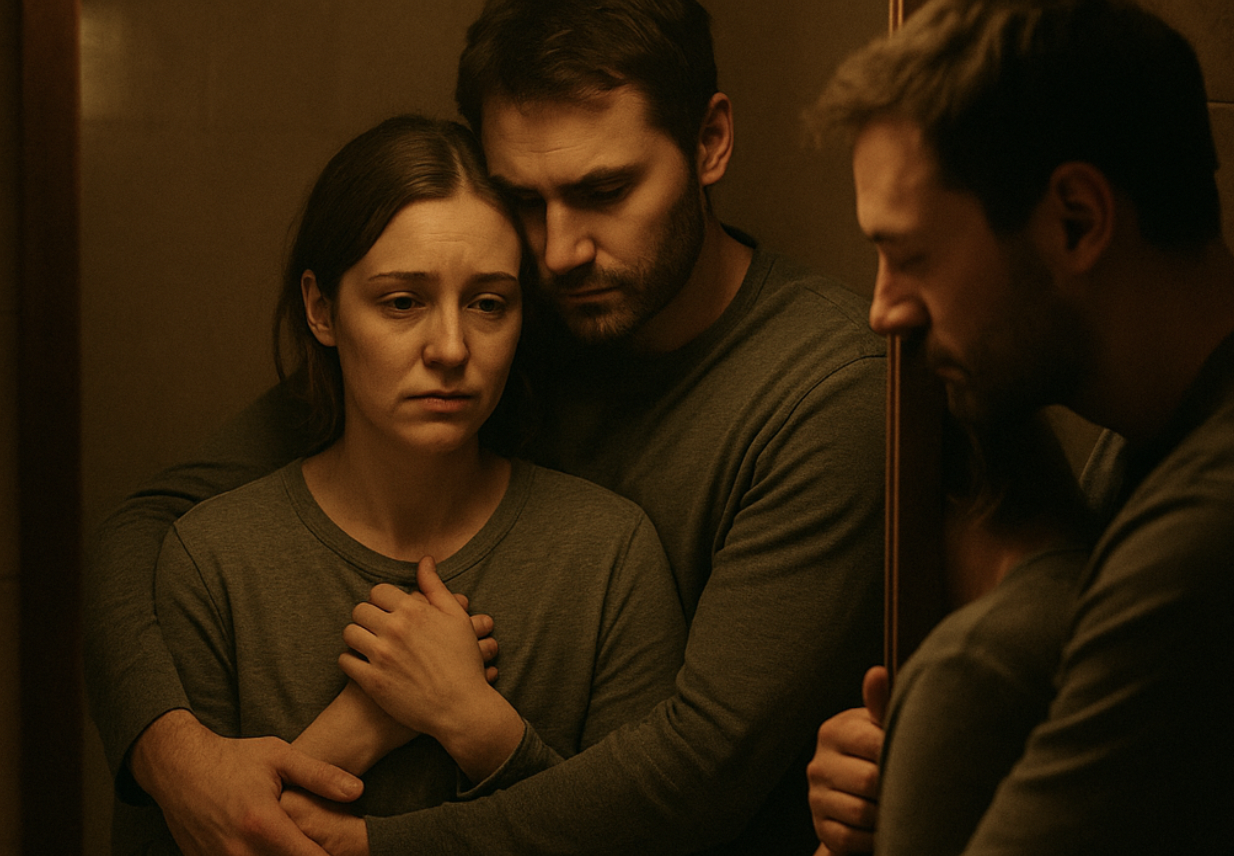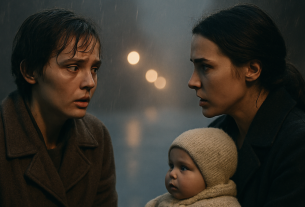Viktor was turning in front of the huge hallway mirror, smoothing the lapels of his brand-new, expensive suit. The fine wet-asphalt–colored wool fit his athletic build perfectly. He was getting ready for the corporate gala—the social event of the year in their city, a charity evening organized by the company where he held a high position thanks to his father-in-law’s connections. Alina watched him from the living-room doorway, feeling like a gray, invisible ghost in her own home.
“Will there be couples?” she asked quietly, her voice uncertain, almost apologetic. She knew the answer, but a tiny, irrational hope still flickered inside.
Viktor turned, and his face twisted. He burst into a loud, booming laugh—a laugh with not a trace of joy in it, only cold, cutting contempt.
“Are you serious?” He raked her with his eyes from head to toe. “Have you looked in the mirror lately? You look like a scarecrow. Why on earth would I drag you along just to embarrass myself?”
He walked up to her, grabbed her roughly by the shoulder, and hauled her to that very mirror he’d just been admiring himself in.
“Look,” he hissed in her ear. “What do you see? An old, ugly hag. Don’t worry, I won’t be alone. Unlike you, I’m still wanted by somebody.”
Her husband’s words hit like a slap, knocking the air from her lungs. Alina stared at her reflection, but she didn’t see herself—she saw the pain-distorted face of the woman she had been five years ago. They had lost their newborn daughter then. In the first months Viktor had stayed by her side, supported her, but then he grew distant, losing himself in work and entertainment. She never recovered. Grief had sucked her dry, leaving only an empty, faded shell. And now the man who had sworn to be with her in sorrow and in joy was taking pleasure in grinding her into the dirt.
When the front door slammed behind Viktor, Alina stood before the mirror for a long time. He was right. A gaunt woman stared back at her, with dark circles under her eyes, dull skin, and tangled, colorless hair. Her shoulders slumped, and there was a bottomless emptiness in her eyes. “Lost a child, lost a husband,” flashed through her mind. The thought felt so final, so irreversible, there wasn’t even strength left to cry.
Mechanically throwing on an old coat, she went outside. Her feet carried her to a small city park where she and Viktor had met many years before. She sat on their “lucky” bench and remembered. Back then he had been a simple guy from a modest family—charming, persistent, capable of grand gestures. And she—the only daughter of Sergei Nikolaevich, owner of the region’s largest construction empire. She had been sure he loved her, not her money. But now, replaying their life in her head, she began to doubt. Had he known who she was from the very start? Had it all been a carefully planned scheme?
She recalled their biggest blow-up with her father. It happened a couple of years after the wedding. Viktor, already working at his father-in-law’s company, started nudging Alina to discuss the inheritance. “Try to understand, your father isn’t eternal,” he urged. “And I want to be sure we’ll have a solid foundation. Ask him to transfer the business to me. That way everyone can relax.”
Blinded by love and trust, Alina listened. Her father’s response was sharp and unequivocal. He looked at her with his piercing gray eyes and cut her off: “I see right through your husband. The business will go to you, and only you. And if your Viktor suddenly decides to marry someone else, he can earn his own way.” Spurred on by Viktor’s wounded pride, Alina slammed the door after that and didn’t speak to her father for several years. How right he had been.
“So what, Alinka, fallen apart completely?” came a familiar, slightly hoarse voice beside her.
Alina flinched and looked up. Dmitry, her childhood friend, sat down on the bench next to her. They’d grown up in neighboring buildings, but life had taken them different ways: she married “promising” Viktor, and Dima remained a plain working man—honest and straightforward. He looked her up and down without the slightest embarrassment.
“Mm-yeah, to be honest you’re looking like a solid two out of ten. What happened? Your creep acting up again?”
His bluntness didn’t offend her; it sobered her. And suddenly, swept up by a mad impulse—a mix of despair, anger, and the last remnants of her old adventurous streak—Alina blurted:
“Dima, come with me to the corporate gala. Right now.”
She briefly, haltingly recounted the scene that had played out an hour earlier. Dima listened in silence, the muscles in his jaw working. Then he suddenly laughed—but nothing like Viktor’s laugh. His was warm and a little amazed.
“I thought you’d lost your wild side for good. I remember us jumping off the garage roof as kids. Well then, a gala it is. Here’s the plan: I’m calling my sister. She’s a witch. In a good way.”
Dima’s sister, the owner of the city’s trendiest beauty salon, truly turned out to be a magician. Hearing her brother’s summary of the problem, she cried, “They’re messing with one of ours!” and set to work. For two hours, a hairdresser, a makeup artist, and a manicurist worked their magic on Alina.
While they transformed her, couriers arrived one after another delivering evening gowns from top designers, urgently summoned by the salon owner. When Alina looked at herself in the mirror, she didn’t recognize the woman staring back. A true queen gazed at her from the glass—hair swept up, eyes shining and framed by skillful makeup, posture proud.
When Alina, arm-in-arm with Dima—elegant in a tux rented right there at the salon—walked into the glittering hotel lobby where the charity evening was being held, conversations fell silent. She didn’t walk—she glided, feeling hundreds of admiring, astonished eyes on her. She wasn’t just beautiful—she radiated strength and confidence. Dima, walking beside her, felt not merely like an escort but like an instrument of justice. He saw what she could be, and his heart tightened with tenderness and pride.
Ignoring everyone, Alina went straight to the first row in the hall, where the most honored guests sat. Those seats had always belonged to her family. They sat down, and Alina, back straight, surveyed the hall. Barely five minutes passed before Viktor approached those same seats, swaggering, with a young, heavily made-up blonde in a revealing dress on his arm. He was whispering something cheerfully in her ear, but when he saw who had taken his “rightful” places, he froze mid-sentence.
His face dropped; his eyes widened. He looked at Alina as if he’d seen a ghost. A beautiful, yet fearsome ghost from the past.
“Alina? What… what are you doing here?” he mumbled, all his swagger gone.
Alina gave him an icy look.
“I’m sitting in my place, Viktor. What I don’t quite understand is what you’re doing here. You no longer have anything to do with my family. Be so kind as to free these seats for those to whom they rightfully belong.”
Viktor flushed purple with rage and humiliation. The guests around them watched, holding their breath. The blonde beside him looked lost. At a loss for words, Viktor spun around and dragged his companion away. At that moment the lights onstage dimmed and the host announced the start of the charity concert. The first to perform were the children from the local orphanage. Dressed up, they poured onto the stage and began to sing a touching song. Alina watched them, her heart filling with quiet sadness. And then she froze, her gaze fixed on a single small figure.
Onstage, slightly off to the side of the main group, stood a little girl of about five with two light braids. She sang a bit off-beat but was trying very hard. And on her neck, just under her left ear, there was a large, noticeable birthmark in the shape of an irregular crescent. Exactly like Alina’s. The same one she’d had since birth. Rare, a family trait.
The air stuck in her throat. The world narrowed to a single point—this mark on the child’s delicate skin.
“Dima,” Alina whispered, barely breathing, her fingers digging into his arm. “Now. Call my father. Tell him to come here. Urgently.”
Without waiting for a reply, she leapt to her feet and, pushing past the astonished guests, rushed backstage.
She found the children as they were already coming down from the stage. Running up to the caregiver, Alina, breathless, pointed to that very girl.
“This girl… Masha… Where is she from? How did she end up in the orphanage?”
The caregiver, an older woman, stared in confusion at the excited, elegantly dressed lady.
“I don’t know, I’m new here. You need to speak with the director.”
Alina, not listening, stepped toward the child. The girl looked at her fearfully with big gray eyes. Her father’s eyes—Alina’s father’s. Her heart skipped a beat. The girl was Alina’s spitting image as a child. Darkness swam at the edges of Alina’s vision at the monstrous, unthinkable suspicion forming in her mind.
At that moment her father, Sergei Nikolaevich, burst backstage. He was pale and agitated. Seeing the girl beside Alina, he also froze and turned even paler. A second later Dima appeared in the passage, practically hauling in a resisting, muttering Viktor. Every eye turned to little Masha, who pressed herself fearfully against the caregiver.
Soon the orphanage director arrived, summoned by the frightened caregiver. After hearing Alina’s confused account, she frowned.
“Masha was left with us almost five years ago,” she said thoughtfully. “A young man left her at the door. I believe we should still have a video recording from the security cameras. It was an extraordinary incident.”
While everyone discussed the situation, trying to process what they’d heard, Viktor began quietly inching toward the exit amid the general commotion and slipped away. No one noticed but Dima, who decided not to draw attention to it just yet.
All together—Alina, her father, Dima, and the director—went to the orphanage. With trembling hands, the director inserted an old cassette into the VCR. In the grainy black-and-white footage of the night recording, the orphanage door was visible. A hooded figure ran up, glanced quickly around, placed a bundle on the threshold, rang the bell, and ran off. At one point the man lifted his head, and the light from a streetlamp illuminated his face for a brief instant. Sergei Nikolaevich let out a strangled growl. Alina clapped a hand over her mouth to keep from screaming. They recognized young Viktor on the tape without a doubt.
Faced with indisputable proof of the monstrous deceit, Alina fainted. She came to in a hospital room. Her mother sat beside her, stroking her hand.
“It’s all right, sweetheart, it’s all right,” she whispered. “That scoundrel has been arrested. Dima caught him and stopped your father from taking justice into his own hands. He and his accomplices from the maternity hospital, the ones who drew up the fake death certificate, are already giving testimony. Your husband staged our granddaughter’s death so that, broken by grief, you’d become a pliant puppet and help him seize the entire fortune.”
Despite all the bureaucratic hurdles, Masha began living with Alina from the very first day. Doctors and psychologists made exceptions, understanding how extraordinary the situation was. Alina didn’t let her newfound daughter out of her sight for a second, afraid she might vanish again. “I won’t give her to anyone ever again,” she told her father firmly when he brought up formalities.
A month later, when all the adoption papers—or rather, the restoration of parental rights—were ready, the family decided to celebrate at a restaurant. They invited Dima, too. After dinner, as Alina, her parents, and Masha—holding her mother’s hand—were about to leave, Dima coughed awkwardly.
“Well, I’ll be going then. I’m happy for you. I won’t intrude on a family celebration.”
Alina stopped him, taking his hand. Her eyes glowed with warmth and tenderness.
“Where are you going? You’re already part of our family, Dima. If it weren’t for you, none of this would have happened.”
He looked at her hand in his, then into her eyes, and smiled his honest, open smile.
“You know, Alina, I might like to stay in your family… for good. For keeps.”
Alina laughed—for the first time in many years, truly happily.
“You know, I’ve considered that option. And I liked it very much.”
Three months later, music played in that same restaurant and rose petals drifted through the air. Alina, in a snow-white dress, and Dima, in an elegant suit, received wedding congratulations. Little Masha twirled nearby in her fancy dress, happy and loved. That very day, in a medium-security penal colony, inmate Viktor Smirnov learned from the evening news that his ex-wife had married again. But in his new life, that news changed nothing at all.



